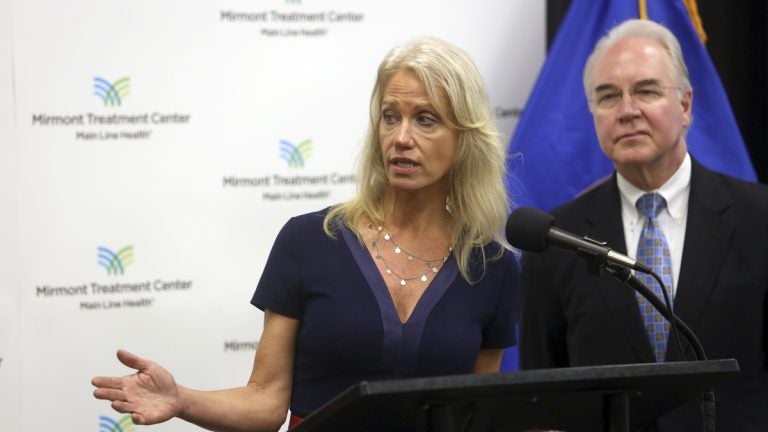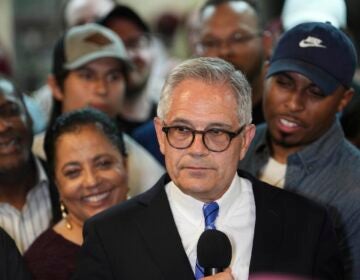On Delaware County visit, Trump emissaries point to progress on opioids
Listen
Counselor to the President Kellyanne Conway speaks as Health and Human Services Secretary Tom Price looks on, at the Mirmont Treatment Center Friday Sept.15, 2017, in Media, Pa. Conway and Price toured the center for drug and alcohol addiction recovery and discussed the opiod crisis. (Jacqueline Larma/AP Photo)
President Donald Trump campaigned on lifting the United States from the depths of the opioid epidemic.
Amid criticism that his administration isn’t acting fast enough on that promise, White House officials stopped in Delaware County Friday to say they’re working on it.
Secretary of Health and Human Services Tom Price and White House counselor Kellyanne Conway visited Mirmont Treatment Center in Media for a closed-door meeting with law enforcement and treatment providers.
They emerged with the stories of people like David Lacey, a former Montgomery County police officer, who is in long-term recovery for substance abuse disorder.
The gravel-voiced cop now works with others in law enforcement and first responders in addiction treatment.
“They’re able to talk to me badge-to-badge, whereas somebody else, they’d still be guarded,” he said, addressing the stigma that accompanies addiction disorders in law enforcement.
But Mirmont CEO Tom Cain said the day’s conversation was dominated by how to pay for services.
“We stay pretty full, and other treatment providers stay pretty full. So access to treatment and more funds are what people were talking about the most,” he said of the “listening session” with stakeholders.
Since taking office in January, Trump has received both cheers and jeers for his drug-addiction policies.
In its proposed 2018 budget, his administration calls for reducing Medicaid funding over time, something that concerns providers. The entitlement program provides funds for about one in three people currently in treatment.
Last month, Trump received bipartisan praise for calling the epidemic a national emergency, at the urging of advisers on his special opioid commission. Two days earlier, Price had said the move was unnecessary.
Since then, the president has not taken steps to make that declaration official. Doing so would mean treating the epidemic like a natural disaster, opening up emergency funds and resources for areas that are hardest hit.
Price told reporters the president is still weighing his options.
“What he’s said is that this is a national emergency, that it requires the full attention of the federal government and the assistance of the federal government to the states and local entities,” said Price. “That’s one of the reasons we’re here today.”
At the press event, Price announced that the Department of Health and Human Services will give out an additional $144 million in grants, through the Substance Abuse and Mental Health Services Administration for expanding treatment for opioid addiction nationwide.
In Pennsylvania, that money will pay for a Norristown program for pregnant women addicted to opioids and a statewide program to increase access to medications that help with recovery.
Both Price and Conway said the federal government’s role is not to set policy, but to amplify the power of groups already working on the issue.
“We believe the people closest to those in need know best how to distribute the funds,” said Conway.
WHYY is your source for fact-based, in-depth journalism and information. As a nonprofit organization, we rely on financial support from readers like you. Please give today.




